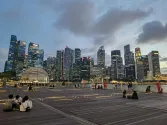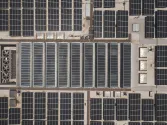
Jakarta retail space supply to increase by 350,000sqm within the next 3 years
Four new malls will be completed this year.
Jakarta’s cumulative supply of retail space reached 4.9 million sqm in 2021 with two new malls completed in South Jakarta.
According to Colliers, Pondok Indah Mall began operating in the first half of the year, and Aeon Mall Tanjung Barat is the newest mall, starting operations at the end of 2021. Two malls currently are under construction, namely Lippo Mall East Side (within Holland Village) and Shopping Mall at Menara Jakarta (within Menara Jakarta). Consecutive completion of these malls is expected in 2022– 2023.
Here’s more from Colliers:
In the Greater Jakarta area, more mall projects are currently under construction. However, the pandemic has slowed construction and completions have been delayed. As a result, we only recorded the extension of Margo City as an addition to cumulative supply, which stands at 2.87 million sq m in 2021.
The development of shopping malls in the Greater Jakarta area is expected to be more vibrant than in Jakarta. The cumulative supply will increase by around 350,000 sq m up to 2025. Four of the future mall projects will be completed in 2022, increasing cumulative supply by 3.3% YOY.
Occupancy
According to the Indonesia Shopping Center Association (APPBI), visitor traffic at re-opening malls is expected to continue to increase, particularly at the year-end holiday. Based on store destination, APPBI added, leasing demand will continue to be driven by F&B and essential sectors such as supermarkets, beauty, wellness and household appliances. In addition, entertainment retailers have also become a destination for people visiting malls.
Nevertheless, due to the impacts of the relatively prolonged pandemic, the increase in visitor numbers has not yet resulted in an improved average occupancy rate, at least in 2021. The average occupancy rate was registered at 70.9% in 2021, a drop of about 5% compared to 2020, or almost 9% compared to before the pandemic. In the Greater Jakarta area, the average occupancy rate was relatively stable for the last three months at 70%, lower by about 5% compared to 2020.
The relatively low number of stores opening at newly operating malls, again due to the impact of the pandemic, has also lowered the average occupancy rate, both in Jakarta and the Greater Jakarta area. However, store expansions and openings are expected to go ahead as retailers re-adapt to the new retail environment post pandemic. Committed tenants are also expected to improve the average occupancy rate.
However, challenges within the retail sector remain; closures and consolidations of underperforming stores are still set to be a key theme.
In our 2022 projection, limited supply will see the average occupancy rate improve in Jakarta, despite modest growth. Conversely, some completed projects will likely continue to put pressure on the Greater Jakarta area, and the average occupancy rate may continue on a downward trend in 2022.
Retailers are getting more confident and are looking to expand again to reap the benefits of the soft market. However, retailers continue to be very selective in terms of location. Strong foreign retail brands are also expected to enter the Indonesian market in different retail segments. They are looking for both standalone and mall spaces where they are likely to quickly implement omnichannel strategies to serve consumers both on- and offline.
With landlords forced to adopt a flexible stance towards rents and terms, tenants may be in a stronger bargaining position. Rather than focusing purely on rents, landlords and tenants should establish better synergies with respect to flexibility in lease negotiations and terms.
Landlords currently are still looking for replacement tenants in a soft market where retailers know they can get more favourable rental terms. To secure tenants, landlords tend to be a bit more flexible by adopting strategies such as lower percentage down payments, flexible exit clauses and negotiated rental caps.
Faced with the dilemma of the pandemic and the need to be cooperative, landlords set relatively unchanged rents in the 2020–2021 period. In Jakarta, the average rent was recorded at IDR566.095 in Q4 2021, relatively flat YOY. Growth in rental rates was mainly due to newly operating malls, which set higher than market rental rates. The same trend was seen in the Greater Jakarta area, where the average rent was recorded at IDR384,121 in Q4 2021, remaining relatively stable in the last three months.
Landlords are expected to mostly focus on increasing the occupancy rate. Nevertheless, it is still possible some landlords, especially those who have maintained high occupancy rates, will set new rental rates in 2022.
In line with rental rates, any service charge increase was due to the operation of new malls. In 2021, service charges in both the Jakarta and Greater Jakarta area grew by around 3%, compared to 2020. In Jakarta, the service charge was recorded at IDR149,166, and IDR116, 594 in the Greater Jakarta area.


















 Advertise
Advertise







